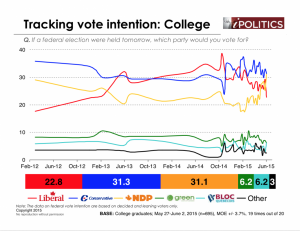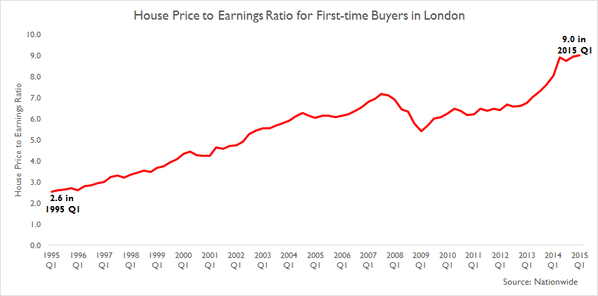This is entirely the result of the decisions made by Liberal Party leader, Justin Trudeau, and by NDP leader, Thomas Mulcair. After Parliament was attacked by a mentally ill man, the Canadian Prime Minister, Harper, decided to push through a surveillance and police state bill, Bill-C51. This bill voided about half the Canadian Charter of Rights and Freedom.
Immediately after the attack, support for the bill was in heavy majority territory. So Justin Trudeau, the Liberal leader, decided to support it. Mulcair decided not to support it.
But Canadians turned out to be more sensible and principled than Trudeau thought (indeed, I was surprised, though I would have done as Mulcair did as a matter of principle); as time went by and the details of the bill came out, they turned against it.
More importantly, left-wing swing voters turned against it. And seeing that it was supported by the Liberal party, they turned against the Liberal party and towards the NDP, whose principles now appear to be driven by something other than polls.
Or, as I sarcastically noted some time ago, “I’d like to thank Justin Trudeau for single-handedly reviving the NDP’s election chances.”
Justin Trudeau is, for those who don’t know, the son of the great Pierre Trudeau, who ran the country through much of the 70s and 80s, and who is beloved by many on the left (and truly hated by many on the right, and in the West). Justin is also quite pretty, and has beautiful abs, which he showed off in a boxing match he won.
He was the heir-presumptive from the moment he was coronated by the Liberal Party (calling it an election implies there was any chance the Liberal Party wasn’t going to choose him)—the polls consistently showed the Liberal Party under him as the main opposition party to the Conservatives.
Meanwhile Mulcair kept just doing most of the right things. And one day Justin, who was always quite clearly a neo-liberal with few actual left-wing beliefs, made an error of judgment and character which left-wing swing voters weren’t willing to overlook.
Let me put this precisely: The job of a political party is either to get a few specific people into power, or it is to offer a clear option to the voters. If it is the second, then your job is to make sure that option remains available. In many cases, if you do so, you will get into power fairly soon—after two to three terms. In other cases, if you are a minor party, it may take decades.
If you genuinely believe in your policies, in your ideology, whatever it is, then that is fine. The public has a right to choose, you just make sure they have a real choice and not a menu that is all of the same.
Your job is to offer a clear choice. Mulcair, fairly consistently, has offered that clear choice. Perhaps he did so out of principle, perhaps he did so out of strategy, perhaps it was both, I don’t know. But it has paid off. If he had offered the same as the Liberals, those voters would not have gone to the NDP. (I happen to believe, in this case, that it is principle.)
The election is still some way off, and there is no way to be sure who will win. But this has changed a multi-year dynamic in a significant way. Last election made the federal NDP the official opposition party, but it did so on the back of the personal charisma of the previous NDP leader: Jack Layton. One election is not a pattern. Two elections start becoming one.
If the NDP either wins the election or becomes the official opposition again, one will be able to make the case that they are one of the two main parties. At that point, strategic voting starts cutting heavily against the Liberals (a thought which brings most NDP supporters great schaenfreude). If you want the Conservatives out, you must vote NDP, not Liberal, so as to “not split the vote.”
I find that funny beyond describing.
And as for Trudeau, he was always an empty suit: A man cruising on his father’s name, “le Dauphin”, with no real accomplishments or weight of his own. Since their coup against Chretien, the Liberals have repeatedly selected as their leaders either men with little charisma (Martin, Dion), no weight (Trudeau), or neither weight nor charisma (hello Michael Ignatieff). Perhaps they should decide to believe in something other than being in power, and in doing so, deserve to be in power.
If you enjoyed this article, and want me to write more, please DONATE or SUBSCRIBE.


